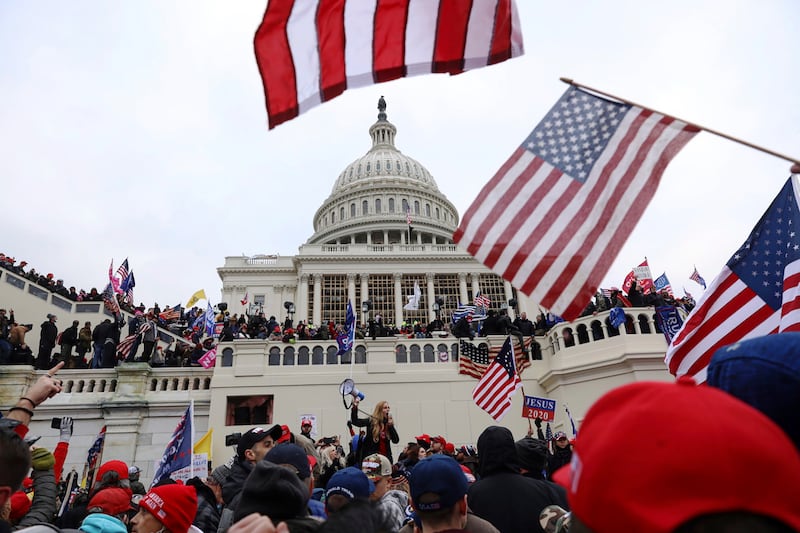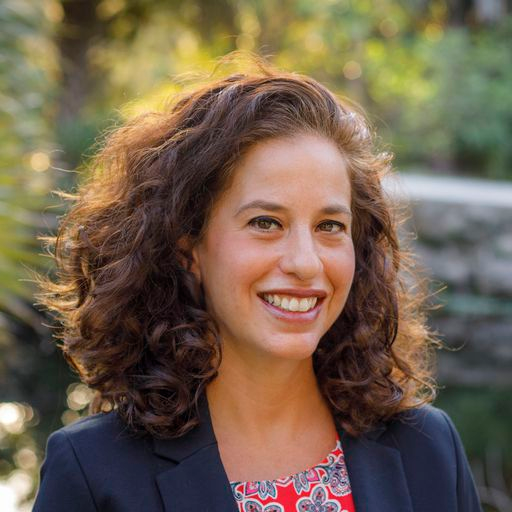WASHINGTON — On Inauguration Day, Washington looked less like a city celebrating a new president and more like a war zone. The military-manned checkpoints began more than a mile out from Capitol Hill; streets were blocked by cement barricades, army vehicles and buses; razor wire ringed a generous perimeter; and soldiers, national guard, and police were everywhere. Even TSA workers — usually employed at airports in other parts of the country — were brought in to help with the security efforts in the wake of the Jan. 6 insurrection.
Still, up until the last minute, it was unclear whether Trump supporters would turn out — and whether they would show up in force — to make one final effort to “Stop the Steal,” as they put it earlier this month. In the lead-up to the inauguration, chatter on platforms like Telegram circulated conspiracy theories claiming that calls for armed protest were actually left wing plots — “bait,” as many put it — to limit Americans’ Second Amendment rights. Conservatives called on Trump supporters to stay at home.
Nonetheless, a smattering of Trump fans showed up in the city Wednesday. Men and women of faith, they didn’t carry weapons but, rather, prayers. And as they wrestled with the question “What’s next?” they took comfort in their faith.
For the most part, these Americans aren’t expecting Donald Trump to make a victorious return. Some expressed frustration with Republicans, remarking that while a third party might be the answer, they were doubtful anything could break the two-party hold on politics. Turning their eyes to the future, they are certain that the impulses of the past four years aren’t going away and that someone will emerge to fill Trump’s shoes. But who?

‘This country needs God’
Donning an American flag as a scarf to protect her from the cold, Elsa Aldeguer, head of a small grassroots organization called Latinos4Trump of Make California Great Again, said she’d come to D.C. not to protest but to pray for the nation.
Standing a block away from the security perimeter, she said, “This country needs God. We’re godless.”
An immigrant from El Salvador — along with her family, she fled the country’s 12-year-long civil war and arrived in the U.S. as a teenager — Aldeguer embodies larger trends in the Latino community. Though she was raised Catholic, she has since left the church, joining the steady Latino march away from the religion they have historically embraced. In the U.S., a quarter identify as “former Catholics,” according to Pew Research Center. While many Latinos have become evangelicals, Aldeguer attends a Messianic Jewish congregation.
“We don’t have a leader at this point, because our leader is God. We want God in politics.” — Contessa Mendoza
She was in D.C., she said, because “God has put it in my heart to break the narrative that it’s (wealthy) white people who love (former President Trump).” A single mother of a biracial son, Aldeguer worked as a home health aide prior to the pandemic, and rents one room in a house.
“I’m brown,” she said. “My family is from El Salvador. We all voted for (former) President Trump because he’s for life, he’s for our veterans, he’s for our nation. He’s for Israel.”
And though she is an ardent supporter of the former president, she also said, “There’s nothing special about him. ... He is a man that God is using, just like (God) used Abraham, like he used Moses.”
So what happens now that Biden has been sworn in?
Although Aldeguer remains certain the election was stolen, she is resigned to the fact that there is a new president and she still believes “God is working in this nation.”
“Last night, I was feeling a little bit defeated … and I was asking God, ‘What’s next? What’s next?’” she said. With a sweep of her hand, she gestured to the scene around us, telling me that this was all an illusion. “In the end God wins and the devil loses — that was comforting last night when God put it in my heart.”
Reflecting on the events of Jan. 6, Aldeguer added that violence isn’t the answer. “I think we have to pray and ask God for wisdom. He always gives us the right answer,” she said.
With Aldeguer was Contessa Mendoza. An American flag wrapped around her neck, she wore a crusader’s cross, emblazoned in red on a silver pendant. Touching the crucifix, Mendoza explained that she was “on a crusade for Christ. We’ve been on a crusade to save our country, to turn our country back to God.”
Like Aldeguer, Mendoza was raised Catholic only to leave the church and be born again. Though she doesn’t embrace denominations, she said she attends a Foursquare Church, an institution that defines itself as both evangelical and Pentecostal. For some time, Mendoza was a pastor herself. But now, she’s set aside ministering to focus her energy more fully on bringing God into politics.
Mendoza, whose father is from Puerto Rico, said that many Latinos take it for granted that the Democrats are the party for minorities. But leaving the Catholic church meant interrogating all those cherished beliefs about Latino identity, prompting Mendoza to educate herself about the political parties, as well. She went Republican because she felt it most closely aligned with her values. She believes the Latino shift to the right will continue.

In Trump, Mendoza saw “a great leader… an amazing president who was able to mobilize (much of) the country behind one cause,” she said. While she’s disappointed to see him leaving, she added that the political movement she’s part of is “not about following Trump entirely. … We all don’t just die out. It’s about mobilizing to continue pushing for the American values that we have stood on for 200 years that we have in our Constitution: life, liberty and the pursuit of happiness. One nation under God — that is what we continue to do.”
“We don’t have a leader at this point, because our leader is God,” Mendoza said, adding, “We want God in politics.”
Whoever is able to speak to that sentiment might be able to ride their way into office, Mendoza said, sharing another widespread belief among those on the religious right: Christianity “has been attacked over and over and over again.” Other groups are free to worship here in the U.S. and they are steadily running Christians out, she said. Because of that, it’s critical to safeguard religious liberty.
‘It doesn’t end with Trump’
The three men — two young, one middle-aged — were quiet and unassuming. They bore no flags around their necks, no crucifixes, no MAGA hats, no placards. The only thing that gave them away as possible Trump supporters was the Bible camp sweatshirt one wore and the workman’s boots.
Recorder and notebook in hand, I asked first if they were men of faith.
“Yes,” they answered in unison. They all attend Baptist churches.
And are you Trump supporters?
“Yes.”
When I told them I was a religion reporter, the eldest cringed. The media was the whole reason they’d made the trip down from Pennsylvania today. No longer trusting what they read or saw online — they’d been here on Jan. 6 and felt the press had done a poor job of rendering the truth — they’d come down to D.C. to witness Inauguration Day as religious observers.
Nonetheless, I gained their trust and we began to talk. The eldest, as it turned out, is a carpenter; the two younger men are his apprentices.
The one with the Bible camp sweatshirt was Matthew O’Brien. A reddish beard made him look older than his 20 years. Asked how he was feeling on Inauguration Day, he laughed, said, “Well,” as he took a moment to gather his thoughts. “I would say my faith comes first over any political affiliation. So I don’t feel discouraged, you know? I don’t feel like anything has really been lost in the grander scheme.”
“Politically, I would say I feel a little on edge about what’s going to happen next. There’s certainly a lot of unrest. … It feels like things are heating up on both sides,” O’Brien said. “I don’t agree with what Joe Biden said in his inauguration that it’s going to be a time of unity and that everyone is going to come together.”

So who will lead the religious right in these uncertain times?
No one had an answer but all three men agreed that the Republican Party needs to do some self-reflecting and recalibrating.
“I feel like there needs to be something different than the GOP,” said O’Brien. “I don’t really align with them. … I feel like they’re too conservative in some ways.”
The other young man in the group — Cody Stang, 19, who is blonde with a round face and boyish stubble on his cheek — also was less than enthusiastic about the Republican Party, but for the opposite reason. To Stang, the GOP isn’t conservative enough and makes too many compromises.
While he supported Trump, Stang, who looked out at me from under a baseball cap, said, “I wouldn’t call myself a Republican. I would call myself a Constitutionalist or a populist. I feel like Tucker Carlson could really take up the mantle of what Trump left behind.”
O’Brien seconded that because, like Trump, Carlson “tells it like it is.”
The eldest, Robert Yuhas, who also called himself a Constitutionalist, said that as far as a new leader, “Hopefully, nobody who is in office (now.)” Like the Democrats, the men felt that the Republican Party is “part of the elite,” said O’Brien, pointing specifically to Sen. Mitch McConnell and Sen. Mitt Romney, who represents Utah.
In addition to Carlson, the two young men from Pennsylvania enthusiastically offered another name: Candace Owens, a young Black woman who has become popular in conservative circles.
“It doesn’t end with Trump,” Stang said. “A lot of people are worried now that Trump’s gone, ’What are we gonna do now?’ But somebody new will come about. (Trump) started a movement. The movement’s not going away.”


 alt=Mya Jaradat
alt=Mya Jaradat